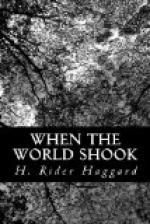For the next year I worked as few have done, and when I struck a balance at the end of it, I found that on the most conservative estimate I was the owner of a million and a half in hard cash, or its equivalent. I was so tired out that I remember this discovery did not excite me at all. I felt utterly weary of all wealth-hunting and of the City and its ways. Moreover my old fastidiousness and lack of perseverance re-asserted themselves. I reflected, rather late in the day perhaps, on the ruin that this speculation was bringing to thousands, of which some lamentable instances had recently come to my notice, and once more considered whether it were a suitable career for an upright man. I had wealth; why should I not take it and enjoy life?
Also—and here my business acumen came in, I was sure that these times could not last. It is easy to make money on a rising market, but when it is falling the matter is very different. In five minutes I made up my mind. I sent for my junior partners, for I had taken in two, and told them that I intended to retire at once. They were dismayed both at my loss, for really I was the firm, and because, as they pointed out, if I withdrew all my capital, there would not be sufficient left to enable them to carry on.
One of them, a blunt and honest man, said to my face that it would be dishonourable of me to do so. I was inclined to answer him sharply, then remembered that his words were true.
“Very well,” I said, “I will leave you £600,000 on which you shall pay me five per cent interest, but no share of the profits.”
On these terms we dissolved the partnership and in a year they had lost the £600,000, for the slump came with a vengeance. It saved them, however, and to-day they are earning a reasonable income. But I have never asked them for that £600,000.
Chapter II
Bastin and Bickley
Behold me once more a man without an occupation, but now the possessor of about £900,000. It was a very considerable fortune, if not a large one in England; nothing like the millions of which I had dreamed, but still enough. To make the most of it and to be sure that it remained, I invested it very well, mostly in large mortgages at four per cent which, if the security is good, do not depreciate in capital value. Never again did I touch a single speculative stock, who desired to think no more about money. It was at this time that I bought the Fulcombe property. It cost me about £120,000 of my capital, or with alterations, repairs, etc., say £150,000, on which sum it may pay a net two and a half per cent, not more.




